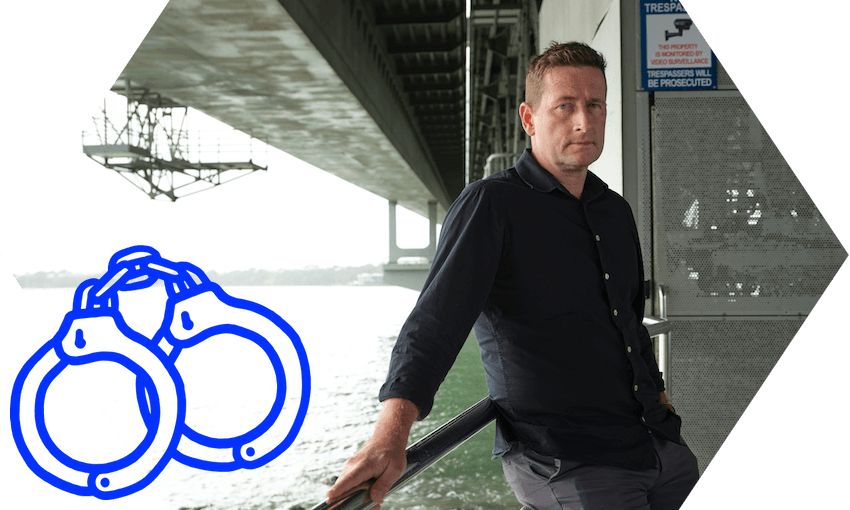Crime: Need vs Greed investigates the true cost of white-collar crime, and whether we can do better for our most vulnerable.
The lowdown
Tim McKinnel wants to challenge our idea of what a criminal is in his new documentary Crime: Need vs Greed. The former detective and private investigator (known for his work in helping overturn Teina Pora’s murder conviction) delves into the impact of white-collar crime in New Zealand, asking why we talk more about traditional crimes like burglaries and drug deals rather than the corporate thefts – driven by greed – that cost New Zealand billions of dollars each year. “I’m worried that we’re locking up the needy and ignoring the greedy,” he says.
Crime: Need vs Greed looks at a variety of white-collar crimes, from complex investment fraud to smaller scale insurance scams. McKinnel talks to a variety of community experts about whether being “tough on crime” works, and how the prison system fails to support vulnerable members of our community, particularly Māori and Pacific Island people. It’s a thought-provoking documentary that ends with a clear answer to McKinnel’s questions: to get tough on crime, you need to get tough on poverty first.
The good
This is a documentary of two halves, with the first looking at the impact of white-collar crime on society, and the second considering the role poverty plays with crime. It’s pulled together by McKinnel as he highlights the inconsistencies between how the courts punish blue and white-collar criminals. “I’m not arguing we should stop holding people to account when they commit crimes,” he says, “but what do we gain from hammering already struggling people while white-collar criminals – most likely to steal our life savings – are more likely to be let off the hook?”
While the numbers of reported burglaries, robberies and drug offences are slowly trending down, white-collar crimes like fraud and scams are rising. McKinnel says this trend isn’t reflected in the media or in society’s opinions. Journalism lecturer Richard Pamatatau tells McKinnel that’s because corporate fraud is not as visually impressive than a car chase or ram raid, and that there’s an inherently racist approach to politicians vowing to “get tough on crime”. “When somebody embezzles a million dollars, I haven’t ever heard somebody say, ‘Let’s go and talk to Rotary. Let’s go and talk to the community leaders about this director or this Ponzi scheme or whatever’,” he says.
Crime: Greed vs Need wants to challenge our ideas of what a criminal looks like, but it’s at its strongest in the second half when discussing the connection between poverty and crime. It argues that we need to change the justice system so those with the least are not punished the most, and speaks with a variety of thoughtful experts who articulate the issues and solutions so clearly that you wonder why the government isn’t fixing our welfare system immediately.
“Poverty is the number one factor that drives criminal offending, because for many people, they don’t think they have any other options.” – Barrister Kingi Snelgar
“There are a number of people who talk about prison being the only place they’ve had a bed, that they’ve been fed, that they have their health care needs, dental needs seen to. That is a shocking indictment on New Zealand society.” – Criminal law lecturer Khylee Quince
“We know the earlier your contact with the criminal justice system, the more likely it’s going to be enduring across your life.” – Psychologist Tracey McIntosh
“You can talk about social mobility, but wouldn’t it be a better world if, actually, we ensured that no one was in poverty in the first place, and all kids were getting a decent start in life?” – Writer Max Rashbrooke
The bad
The worst thing about Crime: Greed vs Need is seeing the statistics laid out bare. Tax law expert Lisa Marriott says while welfare fraud is publicly perceived as a major problem, the annual $26 million loss is nothing compared to the estimated $5-7 billion of tax avoidance each year. Natasha McFlinn, senior fraud manager at ANZ, reported a 91% increase in scam incidents in the last year, which is estimated to cost more than half a billion dollars each year – that’s over a million dollars a day, folks. They’re the crimes we’re too ashamed to talk about, with many scam incidents believed to go unreported to police.
White and blue-collar crimes are also viewed differently by the courts. Marriott noted that for the average tax fraud of $287,000, offenders had a 22% chance of receiving a prison sentence, but for the average welfare fraud of $67,000, offenders were 60% likely to be sentenced. “And only the most egregious of tax evasion cases ever end up being prosecuted,” Marriott adds.
This difference in how society treats white-collar crime is made strongest by Fete Taito, who shares his experiences of growing up in foster care and prison. “Honestly, in the 18 [years] I’ve done in jail, I’ve never seen a white-collar crime boy remanded in custody. They’ve been bailed the whole time. Then the ones I know of, even when they’ve been found guilty and remanded for sentence, they’re out on bail… White collar crime boys, they don’t lose much.”
The verdict
Watch it. Crime: Need vs Greed makes it clear that for the justice system to work, offenders need to have something to lose. White-collar criminals – usually Pākeha, wealthy and powerful – have more to lose than those living in poverty, yet they’re punished less in the courts, partly due to their “good character”. McKinnel leaves you in no doubt that New Zealand is an unequal society, and that things won’t change until we rehabilitate the welfare system. Ultimately, we’re focusing on the wrong criminals. “Imagine what the country could build if there was no tax fraud?” he asks. Imagine, indeed.
Crime: Need vs Greed streams on TVNZ+.



